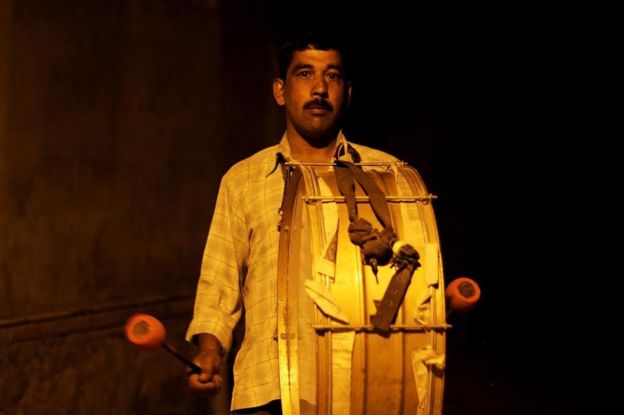
The Ramadan drummers of Kashmir
Every night, during the month of Ramadan, when most of Indian-administered Kashmir remains in deep slumber, Mohammad Rafiq Wani, a sahar-khan (drummer), begins walking the streets of Pampore to awaken Muslims for pre-dawn meals.
Sahar-khwani or calling for pre-dawn meals, is a centuries old Kashmiri tradition during the holy month of Ramadan. Many Muslims do not eat or drink water during daylight in this period.
Although announcements are made on loudspeakers to awaken people for the pre-dawn meals, and many use mobile phones and digital clocks to wake up in time, the tradition of sahar-khwani still remains relevant in large parts of the Muslim-dominated valley.
‘Fragile Situation’
Most of the drummers are poor. Mr Wani, 39, lives in a two-room-building in the congested locality of Pampore with his wife and children, his elder brother and ailing mother.
He took up this job seven years ago, after the death of the previous drummer in his locality. Mr Wani, along with his cousin, starts walking the streets of his locality at two in the morning to wake up believers.
“These streets are deserted in the night. The political situation of Kashmir is so fragile. Sometimes fear consumes me; but then I think about my children. I just can’t afford to miss the opportunity of earning some money for them,” he says.
 “People are usually quite generous during this time, and pay us good money. I made 15,000 rupees ($221;£165) during Ramadan last year,” says Mr Wani.
“People are usually quite generous during this time, and pay us good money. I made 15,000 rupees ($221;£165) during Ramadan last year,” says Mr Wani.
Mr Wani is among hundreds of drummers who perform this service during Ramadan, usually in their respective localities.
Abdul Samad Lone, 45, from the downtown area of Srinagar city, has been waking-up believers during Ramadan for almost two decades.
Hit by Militancy
Mr Lone, who originally hails from Lolab, a border area near the Line of Control – the de-facto border that divides the region in two, with one part administered by India and one by Pakistan – resides in a rented house along with his wife and three daughters.
“I was very young when I took up this job,” Mr Lone says. “I have grown up in this city. Local people have supported me through thick and thin.”
During the early 1990s, Mr Lone’s elder brother became a militant. “He was killed in an encounter with the Indian army. My father was killed and even our house got destroyed in the encounter. We had to flee.”
During the earlier years of militancy in Kashmir, the tradition of Ramadan drummers was badly hit.
Most drummers quit owing to security reasons. “I have been detained and frisked by Indian security forces several times during those years. But the situation has improved a lot now,” says Mr Lone.
Mr Lone, who works as labourer or a caretaker of a mosque during the rest of the year, says that he gets rewarded in “cash and kind”.
“Some people offer us rice and sugar also. Last year I collected six quintals of rice. Ramadan brings a lot of hope,” he says with a smile.

